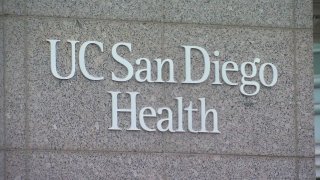
Physicians and scientists at UC San Diego Health announced they began a pair of tests to find novel coronavirus antibodies.
They are looking specifically at people who have previously been infected by SARS-CoV-2, the viral cause of COVID-19, even if they never experienced telltale symptoms.
The effort will be overseen by the UC San Diego Center for Advanced Laboratory Medicine, which houses the majority of the research hospital's clinical laboratories and is already the hub for the health system's in-house diagnostic testing of patients and people suspected of having COVID-19.
"This is part of the next wave of testing," said Dr. Ronald W. McLawhon, director of the laboratory medicine center and UC San Diego Clinical Laboratories. "It's intended to answer those growing questions about who has been infected and who might still be vulnerable to exposure."
The tests analyze blood samples for the presence of two of the body's five classes of antibodies: IgG and IgM. Antibodies are proteins used by the immune system to recognize and help neutralize pathogenic invaders, such as viruses or bacteria. The IgG antibody is the most abundant type, and IgM is one of the first antibody types produced by the body's immune system to fight a new infection.
Looking for these two types of antibodies together increases the treating physician's confidence in being able to differentiate between a recent infection versus a past exposure to the SARS-CoV-2 virus.
McLawhon said initial capacity for serological -- antibody -- testing will be a combination of up to 1,200 of IgM or IgG antibody tests per day, with results within 24 hours.
Local
The presence of novel coronavirus antibodies can reveal who may have unknowingly contracted COVID-19 and recovered, but never showed signs of
infection.
The first testing group will likely be health care workers who may have acquired some degree of immunological protection. At this point, it has not been established whether the presence of IgG antibodies is an indicator of immunity to SARS-CoV-2 infection or re-infection, as seen with many other viruses.
Serological testing will also be used to assess health care workers who are suspected of having COVID-19 and are recovering at home under quarantine.
McLawhon said the tests have shown high specificity, particularly compared to most tests for novel coronavirus now flooding the international market. Thus far, only one rapid serological test, which claims a result within 15 to 20 minutes, has received Emergency Use Authorization from the U.S. Food and Drug Administration.
"There are a lot of these unproven rapid tests out there. Some are performed using technology found in today's pregnancy tests, using a drop of blood," said McLawhon. "But none have gone through FDA review, nor have they been validated in terms of their clinical performance. Many do not perform well. The results aren't clear-cut."
Aside from identifying past coronavirus exposure, serological testing will likely be a valuable epidemiological tool. There are plans to use blood tests to map where the virus has spread, which cities, states, and regions may have developed some degree of "herd immunity" to future outbreaks and which places and populations remain at greatest risk. The U.S. Centers for Disease Control has announced plans for three such clinical trials across the country.



